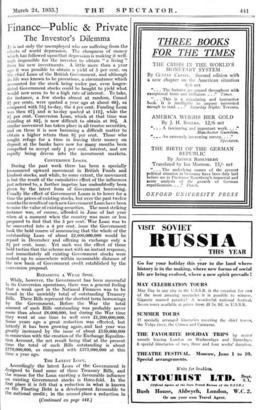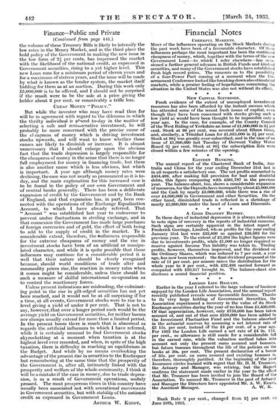Finance—Public & Private
The Investor's Dilemma Jr is not only the unemployed who are suffering from the effects of world depression. The cheapness of money which has followed upon that depression is making it well- nigh impossible for the investor to obtain "a living" from his new investments. A little- more than a year ago it was possible to obtain a yield of 5 per cent, on the chief Loan of the British Government, and although its life was known to be precarious, a circumstance which accounted for the stock being under par, even longer- dated Government stocks could be bought to yield what would now seem- to be a high rate of interest. To take, for instance, a few stocks almost at random, Coniol 21 per cents. were quoted a year ago at about 601, as compared With -751 to-day, the 4 per cent. Funding Loan was then 97i and is to-day quoted at 1121, while the 81 per. cent. Conversion Loan, which at that time was standing at 881, is now difficult to obtain at 991. A similar movement has taken place in all trustee securities, and (in these it is now becoming a difficult matter to obtain a higher return than 3i per cent. Those who sought refuge for a time in leaving their money on deposit at the banks have now for many months been compelled to accept only per cent. interest, and are rapidly being driven into the investment markets.
CONVERSION LOANS.
During the past week there has been a specially pronounced upward movement in British Funds and kindred stocks, and while, to some extent, the movement is but the result of the cumulative effect of the influences just referred to, a further impetus has undoubtedly been given by the latest form of Government borrowing. Usually the effect of Government Loans is to lower for a time the prices of existing stocks, but over the past twelve months the results of each new Government Loan have been to raise the value of existing securities. The most striking instance was, of course, afforded in June of last year when at a moment when the country was more or less prepared to find- that the 5 per cent. War Loan was to be converted into a 4 per cent, issue the Government took the bold course of announcing that the whole of the outstandidg Loan of about £2,000,000,000 would be repaid- December and offering in exchange only a 81 per cent. issue. Yet such was the effect of those bold tactics that the scheme met with an instant response, and immediately all existing Government stocks were rushed up to somewhere within measurable distance Of the new basis of Government credit established by the conversion proposal.
REPAIRING A WEAK SPOT.
While, however, the Government has been successful in its Conversion operations, there was a general feeling that a weak spot in the National Finances was to be found in the unwieldy, total of outstanding Treasury Bills. These Bills represent the shortest terra borrowings by the Government. Before the War the total amount of such Bills outstanding was probably never more than about 18,000,000, but during the War time they went at one time to well over 11,200,000,000. Some years ago a great reduction was effected, but latterly it has been growing again, and last year was greatly increased by the issue of about £150,000,000 In connexion with the creation of the Exchange Equaliza- tion Account, the net result being that at the present time the total of such Bills outstanding is about £776,000,000, as compared with £575,000,000 at this time a year ago.
THE LATEST LOAN.
Accordingly the latest Loan of the Government is designed to fund some of these Treasury Bills, and the reason for the Loan exerting a favourable influence on existing Government stocks is three-fold. In the first _place it is felt that a reduction in what is known as the Floating Debt is a development favourable to the national credit ; in the second place a reduction in (Continued on page 442.)
Finance—Public and Private
(Continued from page 441.) the volume of these Treasury Bills is likely to intensify the low rates in the Money Market, and in the third place the bold policy of' the Government in making the new issue in the low form of 21 per cents, has impressed the market with the likelihood of the national credit, as expressed in Government securities, rising to a yet higher level. This new Loan runs for a mininuun period of eleven years and for a maximum of sixteen years, and the issue will be made by what is known as the tender system, the market itself bidding for them as at an auction. During this week only £5,000,000 is to be offered, and I should not be surprised if the result were to be the sale at a price giving the holder about 8 per cent, or conceivably a trifle less.
CHEAP MONEY "POLICY."
But while the investor who may have read thus far will be in agreement with regard to the dilemma in which the thrifty individual is 'Aced to-day in the matter of selecting a safe and- .remuuerative investment, he will probably be more concerned with the precise cause of the cl eapness of money which is driving investment stocks upwards, and will want to know whether those causes are likely to diminish or increase. It is almost unnecessary that I should enlarge upon the obvious fact that the trade depression is largely responsible for the cheapness of money in the sense that there is no longer full employment for money in financing, trade, but there is also another cause which is less obvious, hut which is important. A year ago although money rates were declining, the case was not nearly so pronounced as it is to- day, and the main explanation for this increased ease is to be found in the policy of our own Government and of central banks generally. There has been a deliberate expansion of credit by the Government and by the Bank of England, and that expansion has, in part, been con- nected with the operations of the Exchange Equalization Account, to which I have already referred. That " Account " was established last year to endeavour to prevent _undue fluctuations in sterling exchange, and in that connexion the Government has made large purchases of foreign currencies and of' gold, the effect of both being to add to the supply of credit in the market. To a considerable extent, therefore, the 4nfluences responsible for the extreme cheapness of money and the rise in investment stocks have been of an artificial or manipu- lated character, and while it is quite possible that those influences may continue for a considerable period it is well that their nature should be clearly recognized because, should world conditions of trade alter and commodity prices rise, the reaction in money rates when it comes might be considerable, unless there should be such a measure of skilful international co-operation as to control the reactionary forces.
Unless present indications are misleading, the culminat- ing point in the rise in gilt-edged securities has not yet been reached, and it would not be at all surprising if for a time, at all events, Government stocks were to rise to a level giving a yield of under 8 per cent. That is not to say, however, that over alonger period such would be the average yield on Government securities, for neither booms nor slumps usually extend for more than a limited period. In the present boom there is. much that is abnormal as regards the artificial influences to which I have referred, while it is certainly unusual to find Government stocks skyrocketting at a moment when taxation is at the highest level ever recorded, and when, in spite of the high taxation, there is difficulty in reaching an equilibrium in the Budget. And while by no means overlooking the advantage of the present rise in securities to the Exchequer but remembering at the same time that the prosperity of the Government is, after all, intimately linked with the prosperity and welfare of the whole community, I think it will be a mistake if the ease in money, due to trade depres- sion is as a result of Government operations, unduly pressed. The most prosperous times in this country have usually been associated not with sensational movements in Government securities, but with stability of the national credit as expressed in Government Loans.
ARTHUR W. KIDDY,







































 Previous page
Previous page